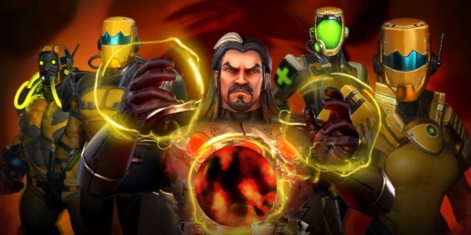This is a guest post from Jeff Weinroth, senior director of sales at mobile advertising and app monetization company Tapjoy.
At one time, getting your app featured on the front page of the app stores was enough to assure success.
Times have changed. Millions of apps saturate today’s mobile market, and even the best made games and apps can have short life cycles without a proper digital marketing and discovery plan in place.
Finding a competitive edge is a challenge when so many developers are trying to stand out.
In recent years, mobile developers have noticed that entertainment brands rarely face this problem.
Mobile game developers FoxNext released Marvel Strike Force and immediately attracted a material audience thanks to the associated IP’s accrued brand equity.
What’s more, every time Marvel Studios releases a new film - most recently Avengers: Endgame - FoxNext sees completely organic performance boosts as new audiences download the app and those associated with the same IP.

This feedback loop allowed Strike Force to generate $150 million in advertising revenue during its first year.
And that’s just Marvel. Branded IP apps for Star Wars or Harry Potter have seen similar success because when it comes to the mobile app world, brand recognition increases the number of organic acquired users, who are easier to retain over the long term with engaging gameplay.
Developers are then free to direct the time and attention of these users towards more of their own branded content or monetize it through other means.
Every time Marvel releases a new film, Marvel: Strike Force sees organic performance boosts as new audiences download the game.
It’s a powerful feedback loop that cultivates engagement before, during, and after a piece entertainment content is released - and it all starts with partnerships between entertainment studios and mobile developers.
Creating a developer/studio partnership
Entertainment studios and mobile game developers each have distinct goals:
- Studios are always pursuing top tier content or hot IPs that can attract theatrical audiences.
- Developers want to design games that acquire, retain, and engage mobile audiences as cost-effectively as possible.
At a content output level, these are completely different types of organizations working on entirely different projects. Entertainment studios don’t have experience creating mobile apps, and developers likely haven’t produced a feature film.
What each party can do, however, is forge a partnership that amplifies a brand’s power through strategic release schedules and harmonious collaborations.
The existence of Marvel Strike Force was itself an advertisement for Avengers: Endgame, for example, while Endgame cultivates interest in superhero games like Strike Force.
These partnerships can be forged and leveraged in countless ways. In most cases, an entertainment studio owns a promising IP, and licenses that IP to a game developer. Many developers can also pitch game ideas to entertainment studios that they feel might harmonize particularly well with a beloved brand.
Sometimes licenses aren’t based in entertainment IP - video games themselves can become the basis of such partnerships. Rovio’s Angry Birds was a hugely successful mobile gaming franchise with multiple popular SKUs to its name.
That attracted the attention of Colombia Pictures, who developed a full-length animated film that became the third grossing motion picture based on a video game of all time.
It’s a track record that proves studios and developers can work together to enhance brands in ways that would be challenging alone. Studios gain a broader reach for their brand while focusing internal development on a single film project.
Launching a mobile gaming app prior to a film’s release is the best strategy for everyone involved.
App developers can experiment with characters and storylines that might not fit within a theatrical release’s scope. The possibilities are endless, if you can manage the relationship and effectively time your app launches.
What’s in an entertainment IP license agreement?
Just as there are countless reasons to form a partnership, there are a myriad of ways to structure a licensing agreement.
There is currently no industry standard relationship between studios and developers, so license terms can take many forms. Some studios might give developers free reign to produce any type of game they wish, while others carefully approve each project to ensure it matches the branded experience.
Most large-scale entertainment studios like Universal or Disney carefully decide who licenses are granted to. As IP holders, they typically have the final say on which games are produced, how marketing is deployed, and how associated content like live streams are managed.
In these instances, studios offer a fixed-term license that either covers a single game, or grants exclusive rights for an entire IP on specific platforms.
Licenses also formalize how revenue will ultimately be divided between each party. If the license is not renewed, games and apps produced under its terms will be delisted from official storefronts.

In yet another possible outcome, entertainment studios might opt to acquire a development team outright. This usually occurs when a studio is interested in owning a developer’s IP, but doesn’t have the expertise to produce it.
With acquisition, studios have effectively hired an experienced creative team as employees for an IP’s future development. As a bonus, no license agreement is required because all decisions are internalized, which means apps won’t need to be delisted from mobile platforms.
The right time to launch a branded app
At Tapjoy, we monitor and analyze ad performance on branded apps, and we’ve noticed a clear pattern.
If an app is available to download prior to a film’s release, every performance metric across the board benefits. You can imagine how well the Marvel portfolio is performing right about now.
There is currently no industry standard relationship between studios and developers, so license terms can take many forms.
Launching a mobile gaming app prior to a film’s release is the best strategy for everyone involved. It lets studios market upcoming movies, while developers can craft thematic game content audiences can enjoy and tap into.
Players become far more engaged before the theatrical main event, and have a similar experience to enjoy after the credits roll. Studios and developers benefit financially as well, thanks to the value proposition of marketing services like playable ads or interstitial videos.
That’s not to say developers should rush to finish an app before release date - a poorly planned game can still risk negative consumer perception of an entertainment brand. It just means that coordinating a strategy in advance will maximize the benefits of studio/developer partnerships.
Film and game companies are increasingly aware of this fact, prompting them to account for such details in the earliest planning stages.
As entertainment studios continue to push for larger-scale experiences for their IPs, partnerships with app developers will become even more common.
Some teams will license brands for limited-time projects, while others will be acquired entirely. But in 2019, these mutual benefits are crystal clear, so these unions will become the norm - if they haven’t already.





















